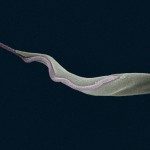Lien vers Pubmed [PMID] – 2463663
Scand. J. Immunol. 1988 Nov;28(5):553-61
The specificity of B lymphocytes activated in the acute phase of murine Trypanosoma cruzi infection was analysed in a panel of immunoglobulin-secreting hybridomas derived by fusion of lymph node cells 7 days after intraperitoneal parasite inoculation. The immunoglobulin isotype distribution of the hybrids reflected the total plaque-forming cell (PFC) response in the animal at this point, with a predominance of IgG2a, IgM, and IgG2b. Screening of the hybridoma antibodies on parasite antigens by three independent methods (western blot, ELISA, and immunofluorescence) revealed only one (out of a total of 51) that bound a parasite molecule with an apparent molecular mass of 180 kDa. In contrast, antibodies of both IgM and IgG classes were found to react with a panel of autologous antigens. These results establish that most B cells activated by T. cruzi infection are not specific for parasite antigens and therefore indicate the relevance of analysing the totality of host responses to infection.
